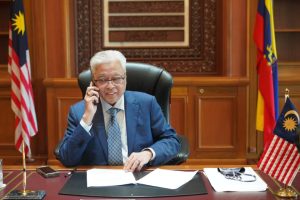On Wednesday, Malaysia announced that it plans to seek China’s views on AUKUS, the new defense partnership between the United States, the United Kingdom, and Australia, amid divided regional opinion about the new pact.
The new tripartite partnership, a response to China’s growing power and assertiveness in Asia, particularly in the strategically important South China Sea, has upended the region’s strategic landscape.
Will most of the headlines about AUKUS have focused on the fact that it will see Australia gain a nuclear-powered submarine fleet, the agreement is also important, as James Crabtree noted this week, for the “signal of resolve it sends, and the military cooperation it may bring in areas linked to emerging technologies.”
Speaking in parliament on Wednesday, Malaysia’s Defense Minister Hishammuddin Hussein proposed an immediate working trip to China to discuss AUKUS. “We need to get the views from the leadership of China, especially China’s defense, on AUKUS that was announced by the three countries and what are their actions following the announcement,” Hishammuddin said.
This came a few days after the new Malaysian Prime Minister Ismail Sabri Yaakob expressed his worries about the agreement, saying that the AUKUS pact could “provoke other powers to take more aggressive action in this region, especially in the South China Sea.” He added that it could be a “catalyst for a nuclear arms race in the Indo-Pacific region.” Indonesia reacted similar to the announcement of AUKUS, noting that it was “deeply concerned about the continuing arms race and power projection in the region.”
Malaysia’s desire to gauge Chinese opinion is somewhat confusing, given that Beijing has already made its view clear. Chinese Foreign Ministry spokesperson Zhao Lijian said that AUKUS reflected an “outdated Cold War zero-sum mentality and narrow-minded geopolitical perception” that “intensified” a regional arms race and harmed international non-proliferation efforts. (In fact, the Chinese reaction was relatively restrained by its recent “wolf warrior” standards.)
Earlier this week, I noted the likelihood that while they have serious concerns about becoming the pawns in a new superpower struggle, most Southeast Asian governments would learn to live with the agreement – even if not, like the Philippines, actively embracing it – and turn it to their advantage. (For instance, some Malaysian experts have suggested that the defense establishment is quietly supportive of the AUKUS pact.) At the same time, those nations that are most delicately poised between China and the U.S. can’t be seen to support it publicly.
This offers a plausible explanation for the Indonesian and Malaysian reactions. It also explains the exquisitely ambiguous reaction of the Vietnamese Foreign Ministry spokesperson Le Thi Thu Hang. When asked about the AUKUS partnership at a press conference yesterday, she said merely that “peace, stability, cooperation, and development in the region and the world is the common goal of all countries, to which countries have the responsibility to contribute.”
For good measure, she added that “Vietnam always keeps a close watch on developments in the regional situation,” and that “the development and use of nuclear energy must serve peaceful purposes and socio-economic development.”
Vietnam’s strategic ambiguity is not hard to understand. While Hanoi will no doubt welcome any initiative that deters China from the use of force, its relationship with its northern neighbor has been most acrimonious when China has viewed it as a proxy of wider hostile forces, as in the 1980s.
In Malaysia’s case, Prime Minister Ismail’s public statement would seem to have performed the necessary “signaling function” to Beijing. This begs the question of why senior Malaysian officials would need to travel to China for this purpose, and whether he is showing an unnecessary degree of deference to the Chinese government.

































